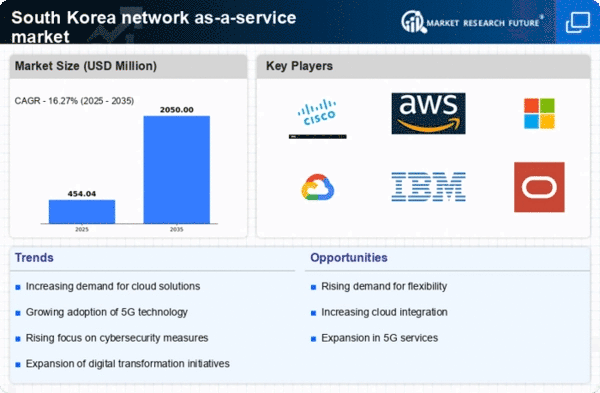Growing Emphasis on Network Security
The growing emphasis on network security is a pivotal driver for the network as-a-service market in South Korea. With the rise in cyber threats and data breaches, organizations are prioritizing robust security measures to protect their networks. The network as-a-service model often includes integrated security features. This makes it an attractive option for businesses concerned about safeguarding their data. Recent reports indicate that approximately 70% of South Korean enterprises are investing in enhanced security solutions as part of their networking strategy. This trend underscores the importance of security in the decision-making process for network services. As the demand for secure networking solutions continues to rise, the network as-a-service market is expected to expand to meet these security needs.
Integration of Advanced Technologies
The integration of advanced technologies is a significant driver for the network as-a-service market in South Korea. The adoption of technologies such as artificial intelligence (AI), machine learning (ML), and the Internet of Things (IoT) is reshaping networking capabilities. These technologies enable enhanced data analytics, automation, and improved network management. In fact, a recent survey indicates that over 45% of South Korean companies are investing in AI-driven networking solutions to optimize performance and reduce operational costs. This trend suggests that the network as-a-service market is evolving to incorporate cutting-edge technologies, thereby enhancing service delivery and customer satisfaction. As businesses increasingly rely on these technologies, the demand for innovative networking solutions is expected to grow.
Support for Remote Work and Collaboration
The support for remote work and collaboration is significantly influencing the network as-a-service market in South Korea. As organizations adapt to new work environments, there is an increasing need for reliable and efficient networking solutions that facilitate remote collaboration. The network as-a-service model provides the necessary infrastructure to support remote teams, ensuring seamless connectivity and communication. Data suggests that around 55% of South Korean companies are enhancing their networking capabilities to accommodate remote work. This shift indicates a broader trend towards flexible work arrangements, which is likely to drive further growth in the network as-a-service market. As businesses continue to embrace remote work, the demand for effective networking solutions will remain strong.
Rising Demand for Flexible Networking Solutions
There is a notable surge in demand for flexible networking solutions in South Korea. Businesses are increasingly seeking to adapt their network infrastructure to meet dynamic operational needs. This shift is driven by the necessity for scalability and agility in a rapidly evolving digital landscape. According to recent data, approximately 60% of enterprises in South Korea are prioritizing flexible networking options to enhance their operational efficiency. This trend indicates a growing recognition of the importance of adaptable network solutions, which can be tailored to specific business requirements. As organizations continue to embrace digital transformation, The network as-a-service market will expand, providing innovative solutions that cater to diverse networking needs.
Focus on Cost Efficiency and Resource Optimization
Cost efficiency and resource optimization are critical factors influencing the network as-a-service market in South Korea. Organizations are under constant pressure to reduce operational costs while maintaining high-quality service delivery. The network as-a-service model offers a compelling solution by allowing businesses to pay only for the resources they utilize, thereby minimizing unnecessary expenditures. Recent statistics reveal that companies adopting this model have reported up to a 30% reduction in networking costs. This financial incentive is driving more enterprises to consider network as-a-service as a viable option for their networking needs. Consequently, the market is likely to witness increased adoption as businesses seek to streamline their operations and enhance profitability.
















